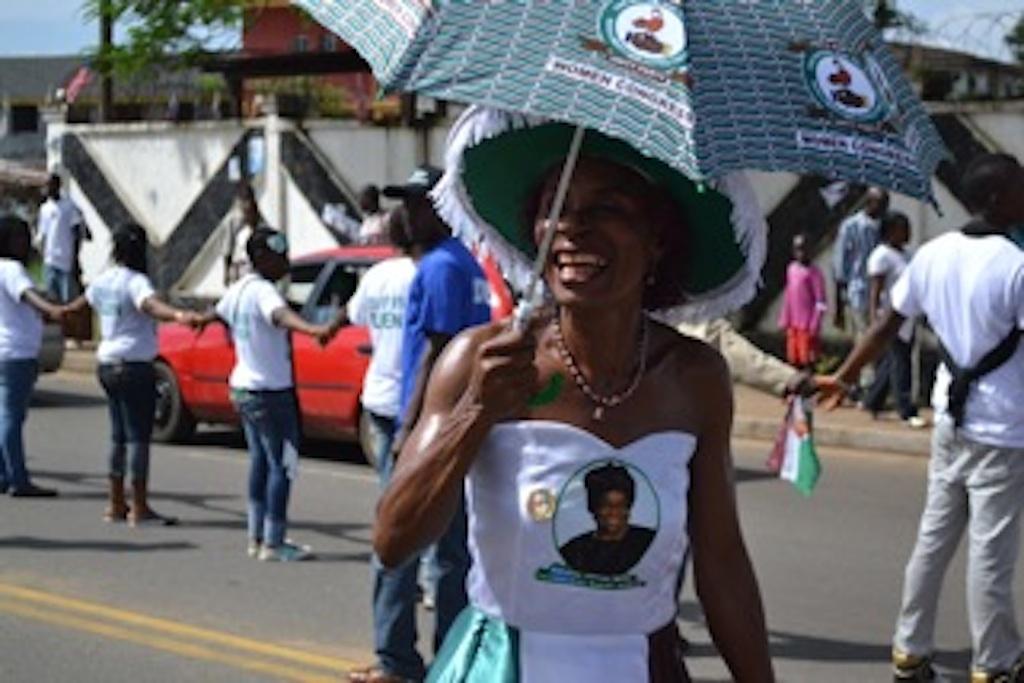Africa News: Continent challenged by lack of respect for human rights
A jubilant supporter of President Ellen Johnson Sirleaf is pictured here. Presidential elections are scheduled in Liberia for Oct. 11, 2011.
JOHANNESBURG, South Africa – Africa's biggest challenge is the widening gulf between the continent's robust economic growth and its declining respect for human rights and the rule of law, warned Mo Ibrahim, the Sudanese-born telecom billionaire.
This “unbalanced” approach to governance may well be a “trigger for instability” across the continent, as it already has been in North Africa, Ibrahim’s foundation said in an annual ranking of African governments.
Ibrahim, speaking by video link from London with journalists around Africa, announced the findings of the 2011 Ibrahim Index of African Governance, which again saw Mauritius ranked the best-governed country and Somalia the worst.
He praised Africa’s resilience during the global economic crisis, but warned African leaders of “unbalanced development,” in which political participation and rights of citizens are neglected.
“If you don’t believe us, just look at Tahrir Square,” Ibrahim said, referring to the square in Cairo where protesters gathered and finally toppled Egyptian President, Hosni Mubarak.
“If economic progress is not translated into better quality of life and respect for citizens’ rights, we will witness more Tahrir Squares in Africa.”
The annual index has since 2007 rated countries in the areas of safety and rule of law, participation and human rights, sustainable economic opportunity and human development.
More from GlobalPost: Cape Verde former president Pedro Pires wins Ibrahim prize
Egypt and Tunisia ranked in the top 10 for overall governance quality, driven by strong performance in the areas of human development, and to some extent, sustainable economic opportunity. But both countries performed poorly in the field of participation and human rights, with Tunisia ranking in the bottom 10 of both sub-categories.
“Lack of political participation is usually coupled with social injustice, and this is a lethal combination, said Mohamed ElBaradei, the Egyptian Nobel laureate and former head of the International Atomic Energy Angency, who is a member of the committee that awards the $5 million Ibrahim prize for African leadership.
Cape Verde's former president, Pedro Verona Pires, won the 2011 prize, which celebrates excellence in African governance among democratically leaders that leave power willingly after their terms expire. For the past two years, the prize was not awarded due to a lack of suitable candidates.
More from GlobalPost: Cape Verde former president Pedro Pires wins Ibrahim prize
Liberia and Sierra Leone were highlighted in the 2011 index for being the most improved countries, and were praised for showing across-the-board progress.
Madagascar, in turmoil since the 2009 coup, was singled out for showing the most striking decline, with particularly sharp deteriorations in the areas of safety and rule of law, and participation and human rights, researchers said.
More from GlobalPost: Liberia's elections, ritual killings and cannibalism
The 2010 Ibrahim index similarly warned that Africa’s economic gains were at risk because of a slide in the quality of governance.
“Africa’s shareholders – its citizens – are missing in action in many countries,” said Mamphela Ramphele, a former World Bank managing director and a board member at the Ibrahim foundation.
“You cannot have good governance when citizens’ voices are not on the table,” she said.
Ibrahim said the current top 5 best-governed countries — Mauritius, Cape Verde, Botswana, Seychelles and South Africa — are all “balanced” in terms of their progress in all dimensions of governance, with the exception of South Africa, which continues to lag in the safety category due to a high crime rate.
Overall, Southern Africa was the best-performing region, and Central Africa the worst.
The five worst-ranked countries were the Central African Republic, Democratic Republic of the Congo, Zimbabwe, Chad and Somalia.
Africa’s newest country, South Sudan, will likely not be included in the Ibrahim index next year due to a lack of data, researchers said.
In a written statement, Ibrahim noted the role that Africa’s young people can play in holding governments to account.
“We have seen this year that Africa’s young majority are no longer willing to stand for the selective approach to governance adopted by many of our continent’s governments,” he wrote.
“Our young people are demanding a holistic, equitable and inclusive approach to the management of their countries.”
More from GlobalPost: Liberia: Is former warlord Prince Johnson fit to rule?
